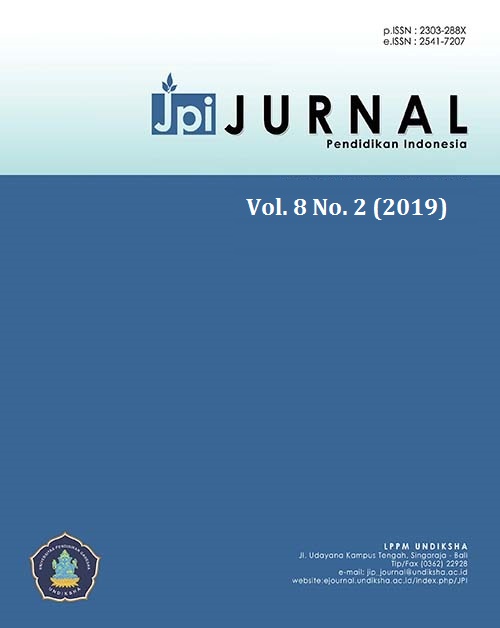A Model of Education and Struggle of Social Status of Rural Women in Practical Politics at Bali Province
DOI:
https://doi.org/10.23887/jpi-undiksha.v8i2.19230Keywords:
political education, Balinese women, gender equality, practical politicAbstract
The targets of this study were: find out a model of the political education for rural women in the province of Bali based on the wisdom of local cultural values. For the first year (2012), the product of this study consisted of: the constellation of practical politics of Bali woman profile, the draft of a model-based political education gender equality, gender mainstreaming draft models for Bali women in the political, scientific articles published in accredited journals. Overall the research data was analyzed using descriptive qualitative analysis techniques and statistical analysis to test the effectiveness of political education model for rural women in Bali. Based on the overall research process, it gained some critical issues related to gender mainstreaming in politics at the indigenous Bali as a conclusion of this study, namely: 1) the pattern of communication and daily activity of customary village communities, the role of women’s political participation tends to be low Bali. It is mostly contributed by the application of patriarchal ideology, an ideology of kinship that put men as central ownership of the rights and obligations of the public at the level of everyday life, so that the position and status of women are subordinated. (2) The status and role of women in politics so marginalized activity, except in some aspects that still exist within the family environment, as can be seen in a symbolic meaning for the name pungkusan each nuclear family. (3) Climate and communication patterns of family life, customary village and administrative village, school does not support the process of political education for indigenous Balinese women to achieve improvement. (4) Customary village as the as the highest symbolism level of the indigenous Balinese, structurally, yet real activity in relation to the political education of the girls. (5) The process of the formation of Indonesian civil society, in conjunction with the purpose and characteristics of the indigenous Balinese customary village turned out to be quite relevant in creating a climate of gender equalityReferences
Abbas, A. (2006). Kesetaraan gender dan pergulatan sosial-ekonomi masyarakat pedesaan. Denpasar: PT. Pustaka Bali Post.
Anderson, B. (1989). Imagined Community (Komunitas-Komunitas Terbayang). Jakarta: Insist.
Ansyar, L (2006). Kebebasan Wanita Tahrirul-Ma’rah fi ’Ashrir-Risalah (penerjemah: Drs. As’ad Yasin). Jakarta: Gema Insani Press.
Ardita, G.P. (2005). Kedudukan dan Peranan Wanita dalam Lembaga Politik. (Laporan Penelitian). Denpasar: Universitas Udayana.
Arga, I.M. (2003). Perempuan Bali dan Pola Ketergantungan Politik, Citra Wanita dan Kekuasaan. Surabaya: Obor Jaya.
Bagus, D.G. (2001). A Study on Customs Pertaining to Twins in Bali. New York: Columbia University Press.
Bawa, A (2006). Bali Pada Era Globalissai Pulau Seribu Pura Tidak Seindah Penampilannya. Yogyakarta: LkiS.
Bae, D. J. (2002). Gender and Politicant Participant. USA: Open University.
Branson, G.M., dkk (ed). (2007). Perempuan Indonesia: Dulu dan Kini, Jakarta, PT Gramedia Pustaka Utama.
Costa, A.T. (2003). The Female World. New York: The Pree Press.
Carspecken, P.F. (1996). Critical Ethnography in Educational Research: A Theoritical and Practical Guide. New York and Londen: Routledge.
Farisa, A. (2006). Wanita Indonesia dan Kesempatan Pengembanagn Karis dalam Dunia Pendidikan Tinggi. Jogjakarta: LP3IS Press.
Foster, Nick. (2003). A case Study of Women Academics, Views on Equal Opportunities Career prospects and Work-Family Conflicts in A British University, Women in Management Review, vol 15. no.7, pp. 316-330.
Harsiwi, T.A.M. dan B. Linggar Yekti N, (2003). Kesetaraan Kesempatan, Prospek Karir, dan Konflik Kerja-Keluarga Akademisi Wanita pada Perguruan Tinggi Swasta di Kopertis Wilayah V Daerah Istimewa Yogyakarta dan Kopertis Wilayah VI Jawa Tengah, (Hasil Penelitian Kajian Wanita), Direktorat Jenderal Pendidikan Tinggi, Departemen Pendidikan Nasional.
Hunterwill, J. (2007). The Grand Theory of Politic. USA: McMilland, co.
Ibran, T.O. (2005). Kajian Wanita dalam Pembangunan. Jakarta: Yayasan Obor Indonesia.
Kaler, I. G. K. (2003). Butir-butir Tercecer tentang Adat Bali Jilid I. Denpasar: Bali Agung.
Kantor Menteri Negara Kependudukan dan Lingkungan Hidup. (2001). Mobilitas Tenaga Kerja Wanita di Indonesia. Jakarta
Lasmawan, I.W. (2005). Perempuan Malam di Kota Singaraja: Studi Eksploratif terhadap penjaja seks komersial di Kota Singaraja: (Laporan Penelitian). Undiksha.
Lasmawan, I.W. (2006). Eksistensi Wanita dalam Struktur Masyarakat Tradisional Bali. (Laporan Penelitian). Undiksha
Lausiana, R. (2005), “Jobs and Gender: How are Women Doing, University Publication Office, Hongkong, didownload dari www.cityu.edu.hk pada tanggal 10 Maret 2002.
Lubis, M.W. (2005). “Situation of Women in Scientific Research in Australia: Equal Opportunity is Not a Strong Enough Tool", Melbourne, Australia.
McTitto, C. (2005). “Adat and Dinas: Village and State in Contemporary Bali. Dalam Hildred Geertz (ed), State and society in Bali. Leiden: KLTLV Press.
Downloads
Published
Issue
Section
License
Authors who publish with the Jurnal Pendidikan Indnesia agree to the following terms:
- Authors retain copyright and grant the journal the right of first publication with the work simultaneously licensed under a Creative Commons Attribution License (CC BY-SA 4.0) that allows others to share the work with an acknowledgment of the work's authorship and initial publication in this journal.
- Authors are able to enter into separate, additional contractual arrangements for the non-exclusive distribution of the journal's published version of the work (e.g., post it to an institutional repository or publish it in a book), with an acknowledgment of its initial publication in this journal.
- Authors are permitted and encouraged to post their work online (e.g., in institutional repositories or on their website) prior to and during the submission process, as it can lead to productive exchanges, as well as earlier and greater citation of published work. (See The Effect of Open Access)








